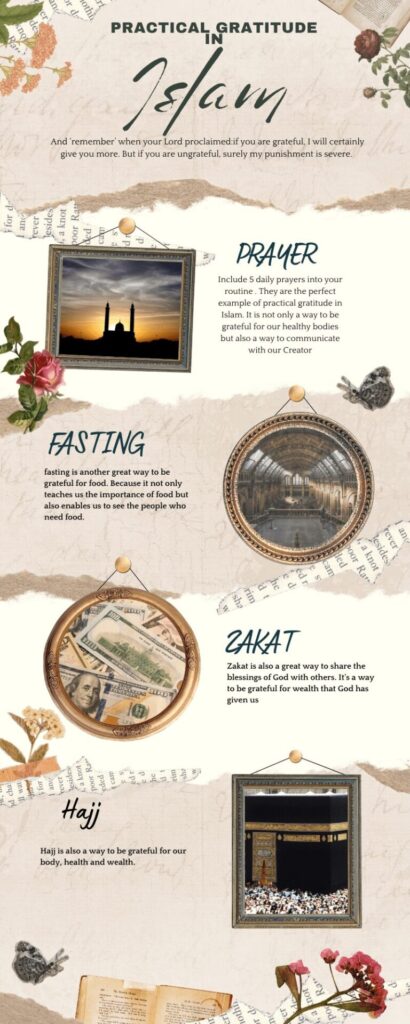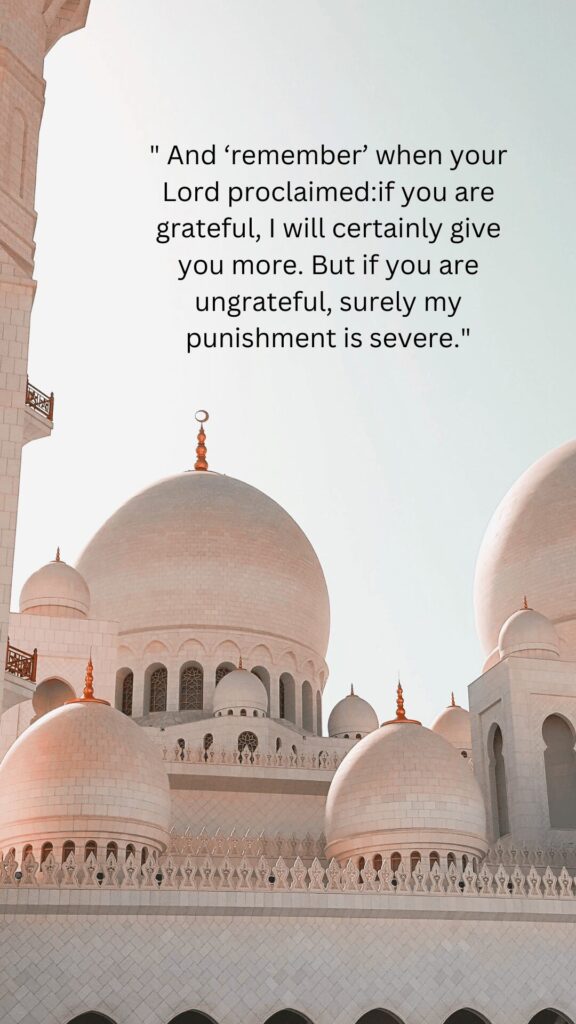
Gratitude in islam
- Gratitude in islam
Gratitude in islam is not merely a word, it is a profound and deep emotion. It is the prostate of our soul and heart in front of the greatness of Almighty Allah. A sentiment that transcends mere words and delves into the essence of our connection with Allah (سبحان وتعالیٰ) .
Alhamdulillah: A profound expression of gratitude in islam
Alhamdulillah (praise to be God) is an expression of our acceptance of His Greatness. Gratitude, or “Shukar,” is a natural quality inherent in both humans and all living beings. When we sincerely say “Alhamdulillah,” expressing thanks from the heart, it signifies the preservation of our innate nature, making us more human.
The innate nature of gratitude
This principle extends beyond humans to encompass animals. For instance, providing water to a thirsty animal elicits a sense of gratitude (shuker) reflected in its eyes.
Consistent care for animals fosters loyalty, highlighting the reciprocal nature of gratitude.
God’s gift
Our life and everything which is created by God to make them more liveable are gifts for us by God. However, humans, as the pinnacle of creation, sometimes take Allah’s gifts for granted, falling in love with the gifts themselves and forgetting the Generous Giver.
This detachment from shuker can damage our true nature.Allah(سبحان وتعالیٰ) ,the Most Beneficent, emphasizes the importance of gratitude numerous times in the Quran. It serves as a reminder for us to appreciate His gifts and maintain our connection with the Ultimate Bestower of blessings.
And ‘remember’ when your Lord proclaimed:if you are grateful, I will certainly give you more. But if you are ungrateful, surely my punishment is severe. ( Chapter 14:Abraham, Verse 7)
He has given us hints of His existence through nature. Have you ever realize that every natural thing shows signs of his existence?
Hazrat Ibrahim’s quest
Hazrat Ibrahim (A.S) was curious about God’s existence. First, he thought a shining star was God because of its brightness. But when the star disappeared at night, he realized it couldn’t be God because God wouldn’t vanish.
Next, he noticed the moon illuminating the dark sky and thought it might be God. However, when the sun rose, and the moon disappeared, he understood that the moon couldn’t be God since it couldn’t outshine the sun.Then, he considered the powerful sun as God because of its ability to light up the day.
However, when the sun set, he realized it couldn’t be God because God wouldn’t set.Ultimately, Hazrat Ibrahim discovered that God is the Creator of everything, including stars, moons, and the sun. His journey helped him see God in a more profoundly and comprehensively. And He learned the essence of gratitude in Islam.
Hidden blessings
What about you?
Have you ever tried to figure out his blessings on you?
Certainly not! We take his blessings as our right. We take them as ordinary things that everyone has. What is so special about them?
Actually we never had time to even think like that. We never cared about what we have until we lose them. And that’s how we can’t understand the essence of gratitude in islam and the reason for our depression and anxiety. Let’s reflect on our thoughts. Let’s be deliberate in finding His blessings. Please look around you and see what you already have. See the nature around you.
Who is the creator of them? Why did he create them?
Look at the sun, without which we can’t continue our life. Look at the air without which we can not breathe. Look at the water at the core of our lives. Observe every single thing around you.
Then look at yourself, you are the living example of His Majesty. From the roots of our hair to the thumb nail of our feets. Everything in itself is so complete and perfect . Every body part completes its own work efficiently and enables us to conquer the secrets of the world.
When you will start observing you will be forced by your heart to say Alhamdulillah. Your heart will prostrate in front of Almighty Allah. And you will be able to learn the true meaning behind gratitude in islam.
Consequence of ungratefulness
But after all of this if you are still ungrateful then you are following the path of Satan. When he refused to prostrate in front of Adam (A.S) and decreased from his position of head of angels , he said to Allah( سبحان وتعالیٰ ) .
Then I(satan) will come upon them from the front and from the rear, and from their right and from their left. And You will not find most of them thankful.— (Quran 7:17)
And in the Quran the term kafir also refers to ungratefulness. Now it’s your choice to be thankful and be an exemplary Muslim or be ungrateful and follow the path of Satan.
In another ayah Allah(سبحان وتعالیٰ ) said that,
Thus We(Allah) punished them because of their ungratefulness. We do not give (such a) punishment but to the ungrateful.— (Quran 34:17)
Ungratefulness is a sin
When Allah ( سبحان وتعالیٰ ) clearly said about ungrateful people that he will punish them so pause for a moment and think that the One who loves us More than 70 mothers, the One who is Raheem and Kareem , Who is our creator saying that he will punishment us for ungratefulness then it must be severe sin.
Yes in Islam it not only is an emotional state but sin which is punishable.
We(Allah) already showed them the Way, whether they ˹choose to˺ be grateful or ungrateful.— (Quran 76:3)
Prophet Muhammad (S.A.W) exemplary gratitude
There are numerous examples of our Prophet which tells us to be grateful .He not only teaches us but showed us by his examples. Allah ( سبحان وتعالیٰ) said that Hazrat Muhammed (S.A.W) is the reason He created the universe for but despite being the emperor of the whole universe, He humbled himself to the point where he was starving for days.
Where Allah ( سبحان وتعالیٰ) offered him that He can turn the mount Ohad into gold but for the sake of ummah He refused. He never said a word of ungratefulness from his mouth.
It has been said in one of the traditions “The first who will be summoned to paradise are those who have praised God in every circumstance.”
So should we follow the path of our Prophet or not?
Ask yourself.
Gratitude shapes fate
Once Prophet Moosa (A.S) was on his way to talk to Allah ( سبحان وتعالیٰ) on Mount Toor. Along the journey, he met two people with contrasting tales.The first guy, all dressed up and drowning in wealth, asked Moosa (A.S) to pass on a message to Allah(سبحان وتعالیٰ ) .
He pleaded, “Tell God to ease up on the riches; I can’t handle more!” Moosa (A.S) nodded and continued.
In the desert, he stumbled upon a poor man, barely covered in sand. The destitute soul asked Moosa to plead with Allah for some wealth, as he couldn’t even afford clothes. Moosa (A.S) promised to convey the message and headed to Mount Toor.
When he reached Allah( سبحان وتعالیٰ ) , he shared both stories. Allah’s response was intriguing. For the rich man, Allah ( سبحان وتعالیٰ) . suggested, “If he wants less wealth, tell him to stop being grateful.” And for the poor man, Allah advised, “If he desires more, let him start expressing gratitude.”
On his way back, Moosa(A.S) delivered Allah’s messages. To the poor man, he said, “Start thanking Allah even if you feel you have nothing.”
But the man, clinging to his poverty, insisted he had nothing to be grateful for. Suddenly, a strong wind blew away the sand covering him, leaving him exposed.
To the wealthy man, Moosa (A.S) conveyed, “If you want a decrease, stop thanking Allah.” The man, wise and grateful, replied, “Why would I stop thanking Allah? His blessings are endless!” As a result, Allah(سبحان وتعالیٰ) . bestowed even more upon him.
And so, the winds of gratitude and ingratitude shaped the fates of these two men in the desert, as guided by the wisdom from the conversation on Mount Toor.
Practical gratitude in daily life
Prayer:
It’s’s not only a great way for reconnecting with God but it also a way to be grateful for our health and body.
Fasting:
Fasting is another great way to practice gratitude, because it teaches us the importance of food Allah has granted us.
zakat:
Zakat is also a great way to share the blessings of God with others. It’s a way to be grateful for wealth that God has given us
Hajj:
Hajj is also a way to be grateful for our body and health.
Zikar of Alhamdulillah
Include Zikar of Alhamdulillah into your routine as a way to thank him daily.
Helping others:
Helping others is an amazing way to be thankful for our worldly power.
Teaching and learning
Teaching others what you learn is gratitude for knowledge .
Understanding Quran
Understanding the Quran, and revealing its secret using our brain is a way to be grateful for our intelligence which makes us superior to animals.
Caring for nature and animals
Taking care of natural objects is a way to show gratitude in islam for His biggest gift which is nature. Taking good care of animals is a way to be thankful for our superiority over them because we have our brains to think with.
Have a look at another article about gratitude in islam


Start thanking Allah even if you feel you have nothing… Lovely